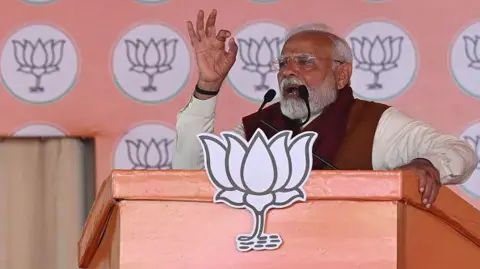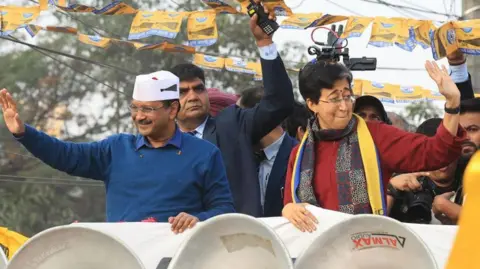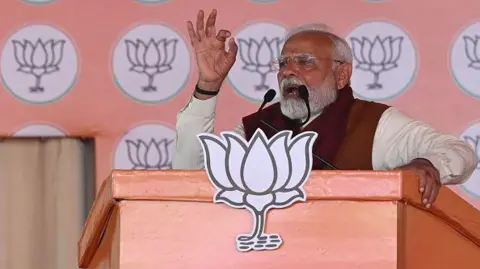BBC News, Delhi
 EPA
EPAVotes are set to be counted in India’s capital Delhi, where Prime Minister Narendra Modi’s Bharatiya Janata Party (BJP) is hoping to stage a comeback after 27 years.
Most exit polls, following the vote on Wednesday, predicted an absolute majority for the BJP, giving them more than 35 seats in the 70-member legislative assembly.
More than 60% of eligible voters cast their ballot in the poll, as per data released by the Election Commission of India.
Winning Delhi is a prestige battle for both frontrunners – the BJP and incumbent Aam Aadmi Party – given its symbolic importance as the capital.
The city, a federally-administered territory, has been governed by the AAP since 2013, with voters backing its strong record of welfarism. But the party has recently been embroiled in corruption allegations – which they have denied.
For the BJP, securing Delhi represents more than just electoral success – it would mark a crucial foothold in the nation’s capital.
The party, which has had recent election success in other states, such as Maharashtra and Chhattisgarh, has thrown resources at the Delhi campaign, with Modi as well as Home Minister Amit Shah attending events.
Meanwhile, most of the exit polls, which are conducted by asking questions to a sample set of voters right after they leave the polling booth, predict fewer than 35 seats for the AAP.
Congress, the main opposition party at the national level, is also in the race, but polls indicate a bleak outlook for it.
The party governed Delhi from 1998 to 2013, but was ousted over allegations of corruption that saw voters turn to AAP instead. It has failed to make a mark since.
However, analysts warn that the exit polls, released by various news agencies, have often been wrong in the past and are not impartial.
 Getty Images
Getty ImagesDelhi has a unique governance structure.
Key decisions related to public order, police and land are taken by the lieutenant governor (LG) who is appointed by the federal government. The state legislature handles matters including education, health and public services.
This division has often caused friction between the federal government and state legislature when they are run by rival parties, analysts say.
The power structure is also a reason why the election campaigning in Delhi is more focused on welfare than on political or identity issues, which play a larger role in elections elsewhere in the country.
The AAP and BJP campaigns both promised improvements to public schools and free healthcare services as well as cash handouts to women.
Meanwhile, the BJP also hoped for a boost from last week’s federal budget, which slashed income tax for the salaried middle class, a key voting bloc in the capital.
 EPA
EPAExperts say that while exit poll results are not the final word, they show that Modi remains popular among Indian voters, despite his party losing its outright majority in last year’s general election.
Much of the BJP campaign targeted the AAP’s chief Arvind Kejriwal, an anti-graft activist, who was jailed in a corruption case relating to a now-scrapped alcohol sales policy last year.
Kejriwal, who denies all allegations and was released on bail in September, has accused Modi’s party of carrying out a “political vendetta” against him and AAP, charges that the BJP denies.
The Supreme Court’s bail conditions ban him from entering the chief minister’s office or signing files. Kejriwal resigned from the role days after his release from prison and there are questions over whether he could resume the role.
One topic, however, remained firmly off the agenda during the bitter weeks-long campaign – Delhi’s perennial air pollution crisis.
Despite being a pressing issue year after year, none of the party leaders or their manifestos addressed the hazardous air that blankets the city of more than 30 million for much of the year.
Follow BBC News India on Instagram, YouTube, Twitter and Facebook.


